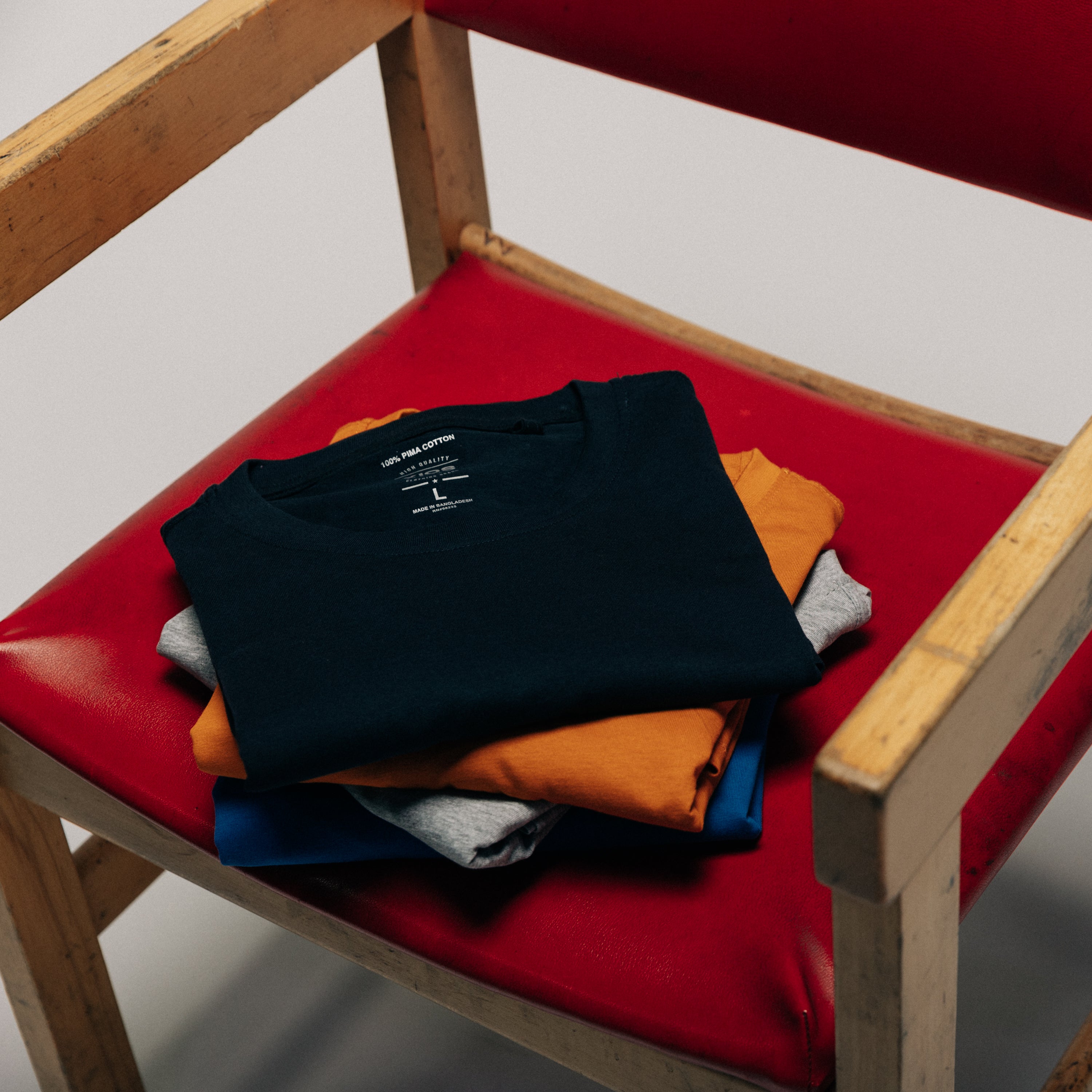Cómo suavizar una camiseta sin mucho esfuerzo

Las camisetas son el elemento por excelencia de la ropa informal, conocidas por su versatilidad y su capacidad para complementar casi cualquier atuendo. Sin embargo, no todas las camisetas ofrecen el mismo nivel de comodidad desde el principio. Algunas pueden resultar rígidas y poco agradables al tacto, por lo que es necesario un proceso de suavizado para mejorar su comodidad. Si se pregunta cómo suavizar las camisetas y hacerlas más cómodas sin gastar demasiado esfuerzo, está en el lugar correcto. Exploremos métodos simples pero efectivos para lograr esa suavidad deseada en sus camisetas favoritas, asegurándose de que sea un placer usarlas en todo momento.
Comprender la tela de las camisetas
Antes de profundizar en los métodos de suavizado, es fundamental comprender que el tejido de la camiseta desempeña un papel importante en su tacto. El algodón, el poliéster y sus mezclas son los materiales más comunes que se utilizan en la fabricación de camisetas.
Cada tipo de tejido tiene sus propiedades únicas y responde de forma diferente a las técnicas de suavizado. El algodón es naturalmente suave y tiende a volverse aún más suave con el lavado habitual, mientras que el poliéster puede requerir un poco más de atención para lograr un nivel similar de suavidad. Reconocer la composición del material de su camiseta es el primer paso para elegir el método de suavizado más eficaz.
Cómo suavizar camisetas de 8 formas
Lavado y secado
Una de las formas más sencillas de suavizar una camiseta es mediante el proceso de lavado y secado. Sorprendentemente, la forma en que lavas y secas la ropa puede afectar significativamente su textura y suavidad. Para un método sin esfuerzo, considera usar detergentes suaves y optar por un ciclo de lavado suave. Los productos químicos agresivos que se encuentran en algunos detergentes para ropa pueden despojar a la tela de su suavidad natural, dejándola rígida y áspera.
Después del lavado, el método de secado de las camisetas también puede influir en su suavidad. Si bien el secado al aire es la opción más suave, puede que no siempre sea la más práctica. Si utiliza una secadora, coloque un par de pelotas de tenis limpias o pelotas de secado. Estas pelotas rebotan durante el ciclo de secado, lo que ayuda a deshacer los grumos de la ropa y a suavizar la tela. Además, configurar la secadora a una temperatura más baja puede evitar que las fibras de la camiseta se tensen demasiado y se pongan rígidas, lo que garantiza que queden suaves y cómodas.
Agentes suavizantes naturales
Para quienes prefieren un enfoque más natural para el cuidado de las telas, incorporar agentes suavizantes naturales a su rutina de lavado puede ser un cambio radical. El vinagre, por ejemplo, es un suavizante natural fantástico que se puede agregar al ciclo de enjuague de su lavado. Sus propiedades ácidas ayudan a descomponer los residuos de detergente que pueden endurecer la tela, dejando sus camisetas suaves y frescas sin el uso de químicos sintéticos.
El bicarbonato de sodio es otro excelente suavizante natural de telas. Incorporar media taza de bicarbonato de sodio en el ciclo de lavado de la lavadora puede suavizar eficazmente las fibras de la camiseta. El bicarbonato de sodio también tiene el beneficio adicional de neutralizar los olores, lo que garantiza que la ropa quede con un olor limpio y una sensación de suavidad.
El baño de agua salada
Un truco antiguo que sigue siendo eficaz hoy en día es el remojo en agua salada. Este método consiste en disolver una cantidad generosa de sal en un recipiente con agua y dejar la camiseta en remojo durante unas horas o durante la noche. La sal actúa como un suavizante natural de tejidos, descomponiendo las fibras rígidas y haciendo que el material sea más flexible y cómodo de llevar. Después de remojarla, simplemente lava la camiseta como de costumbre y notarás una mejora significativa en su suavidad.
Aceptando el período de adaptación
A veces, la forma más sencilla de suavizar una camiseta es simplemente ponérsela. Con el uso normal y los lavados posteriores, las telas se descomponen naturalmente y se vuelven más suaves. Esto es particularmente cierto en el caso de las camisetas de algodón y de mezcla de algodón, que tienden a aflojarse y ofrecer un ajuste más cómodo con el tiempo. Si prefieres un enfoque más relajado, es posible que todo lo que necesites sea usarla y lavarla con regularidad. Este método permite que la tela adquiera naturalmente una textura más suave, lo que mejora la comodidad con cada uso.
El método del congelador
Una técnica poco convencional pero efectiva consiste en utilizar el congelador. Humedezca la camiseta, escurra el exceso de agua, colóquela en una bolsa de plástico y congélela durante la noche. Las fibras de la tela se expanden cuando se congelan y se contraen cuando se descongelan, lo que puede ayudar a ablandar el material. Una vez descongelada, lave la camiseta como lo haría normalmente. Este método es particularmente útil para las camisetas que se sienten demasiado rígidas o que se han encogido ligeramente después del lavado.
Suavizantes y acondicionadores de telas
Si bien muchos prefieren los métodos naturales, los suavizantes y acondicionadores de telas también pueden desempeñar un papel importante para lograr la suavidad deseada. Estos productos están diseñados específicamente para suavizar las fibras, lo que los convierte en una opción conveniente para quienes buscan agilizar el proceso de lavado. Sin embargo, es importante usar estos productos con moderación, ya que el uso excesivo puede provocar la acumulación de suciedad en la tela, lo que en realidad podría reducir la capacidad de la prenda para respirar y absorber la humedad. Una pequeña cantidad agregada al ciclo de enjuague puede marcar una diferencia notable en la suavidad de sus camisetas.
Acción mecánica: el truco de la piedra pómez
Si desea utilizar un método más práctico, considere la posibilidad de utilizar una piedra pómez. Este método es especialmente eficaz para tratar zonas específicas de una camiseta que puedan resultar más ásperas o rígidas que otras. Frotar suavemente una piedra pómez seca y limpia sobre la tela puede ayudar a aflojar las fibras rígidas, lo que hará que el material quede más suave. Tenga cuidado de no exagerar, ya que frotar con mucha fuerza puede dañar la tela. Esta técnica es más adecuada para materiales duraderos y debe ir seguida de un lavado habitual para eliminar las fibras sueltas.
La importancia de un almacenamiento adecuado
La forma en que guardes tus camisetas también puede afectar su suavidad. Evita colgarlas en perchas de alambre, ya que pueden estirar la tela y hacer que las prendas se deformen. En lugar de eso, dóblalas cuidadosamente y guárdalas en un cajón o en un estante. Esto ayuda a mantener la integridad de las fibras y evita que el material se estire o se esfuerce innecesariamente, manteniendo tus camisetas suaves y listas para usar.
Consejos profesionales para una suavidad duradera
Para garantizar que sus camisetas se mantengan suaves a largo plazo, tenga en cuenta estos consejos adicionales:
- Evite el calor intenso
Las altas temperaturas en el proceso de lavado pueden afectar significativamente la suavidad y durabilidad de las fibras de tu remera. Cuando se exponen a altas temperaturas, ya sea en la lavadora o en la secadora, las fibras de tus remeras pueden contraerse y, con el tiempo, volverse duras o quebradizas. Esto no solo disminuye la comodidad de tu prenda, sino que también puede provocar que se encoja y pierda la forma, lo que reduce la vida útil general de tus remeras favoritas.
Para evitar estos resultados, es fundamental seleccionar configuraciones de temperatura baja al lavar las camisetas. El lavado con agua fría suele ser suficiente para limpiar la ropa de uso diario, mientras que el secado en secadora con un ciclo de temperatura baja o solo con aire puede ayudar a preservar la suavidad natural de la tela y evitar que se encoja. Si sigue estos métodos de lavado más suaves, se asegurará de que sus camisetas sigan siendo cómodas y estén en buenas condiciones después de usarlas.
- Limite la exposición al blanqueador con cloro
Si bien el blanqueador es un recurso común para blanquear los blancos y eliminar las manchas difíciles, el blanqueador con cloro puede ser particularmente agresivo para las fibras de las telas. Su fuerte composición química puede debilitar las fibras, lo que provoca una notable disminución de la suavidad de las prendas con el tiempo. Además, el uso habitual de blanqueador con cloro puede desteñir las camisetas y hacer que luzcan descoloridas o desteñidas.
Para mantener sus camisetas brillantes y suaves, opte por blanqueadores sin cloro que no dañen los colores cuando sea necesario. Estas alternativas son menos agresivas para las telas y están diseñadas para aclarar o desinfectar sus prendas de manera segura sin los efectos dañinos del cloro. Incorporar estas opciones más suaves a su rutina de lavado ayudará a mantener los colores vibrantes y la textura suave de sus camisetas, asegurando que se sientan tan bien como se ven.
- Gira tu armario
Usar las mismas camisetas repetidamente puede hacer que se desgasten rápidamente, lo que compromete su suavidad e integridad estructural. Al igual que cualquier otra parte de tu guardarropa, las camisetas necesitan un descanso para mantener su condición. Rotar las camisetas que usas con regularidad puede reducir significativamente el desgaste de una prenda individual, distribuyendo uniformemente el desgaste en toda tu colección. Esta práctica no solo extiende la vida útil de tus camisetas, sino que también preserva su forma y suavidad.
Al darle a cada camiseta el descanso adecuado entre usos y garantizar un uso variado de su guardarropa, ayuda a mantener la resistencia de la tela y evita el envejecimiento prematuro. Además, rotar su guardarropa le permite disfrutar de toda la gama de su ropa, dándole vida a todas sus piezas y garantizando que cada camiseta siga siendo una parte preciada de su atuendo.
XIOS America, una marca conocida por su calidad superior y sus opciones de ropa elegantes, que incluyen una variedad de camisetas de manga corta y de manga larga , comprende la importancia de la comodidad en la ropa de uso diario. Nuestro compromiso de garantizar que nuestros clientes disfruten no solo de los mejores diseños, sino también de una comodidad incomparable, nos ha llevado a compartir conocimientos sobre cómo suavizar las camisetas sin esfuerzo. Ya sea que prefiera las camisetas de manga corta o de manga larga, seguir estas pautas garantizará que sus prendas XIOS America mantengan su calidad y se vuelvan aún más cómodas con el tiempo.



